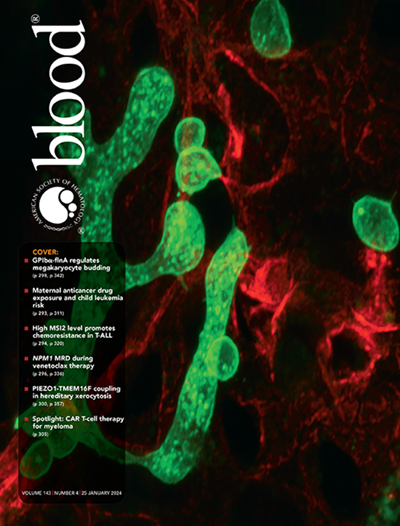大b细胞淋巴瘤留下一种功能失调的免疫表型,在治疗后持续数年。
IF 21
1区 医学
Q1 HEMATOLOGY
引用次数: 0
摘要
免疫疗法已成为弥漫性大b细胞淋巴瘤(DLBCL)治疗的标准治疗方法。首次诊断时观察到的免疫表型变化预测治疗结果,但对缓解期这些改变的解决知之甚少。来自新鲜外周血的免疫变化的综合表征显示,治疗前骨髓源性抑制细胞增加,naïve t细胞减少,活化和终末分化t细胞增加,治疗后加剧。提示因果关系,在小鼠中注射淋巴瘤引起了小鼠T细胞的类似变化。在乳腺癌和AML幸存者中发现了不同的免疫印迹。已确定的改变持续超过5年的完全缓解,并且在DLBCL中与促炎标志物如IL-6、B2M或sCD14的增加相关。慢性炎症与针对sars - cov -2特异性肽的t细胞免疫功能减弱有关,并与n细胞减少相关。深度测序和细胞因子谱证实了持续的炎症,共同指向先天免疫的代偿激活。缓解期持续的淋巴瘤引起的免疫改变可能解释长期并发症,对疫苗策略有影响,并可能与免疫疗法相关。本文章由计算机程序翻译,如有差异,请以英文原文为准。
Large B-cell lymphoma imprints a dysfunctional immune phenotype that persists years after treatment.
Immunotherapy has become standard of care in the treatment of diffuse large B-cell lymphoma (DLBCL). Changes in immunophenotypes observed at first diagnosis predict therapy outcome but little is known about the resolution of these alterations in remission. Comprehensive characterization of immune changes from fresh, peripheral whole blood revealed a functionally relevant increase of myeloid-derived suppressor cells, reduced naïve T-cells, and an increase of activated and terminally differentiated T-cells before treatment which aggravated after therapy. Suggesting causal relation, injection of lymphoma in mice induced similar changes in the murine T cells. Distinct immune imprints were found in breast cancer and AML survivors. Identified alterations persisted beyond five years of ongoing complete remission and in DLBCL correlated with increased pro-inflammatory markers such as IL-6, B2M, or sCD14. The chronic inflammation was associated with functionally blunted T-cell immunity against SARS-CoV-2-specific peptides and reduced responses correlated with reduced Tn-cells. Persisting inflammation was confirmed by deep sequencing and by cytokine profiles, together pointing towards a compensatory activation of innate immunity. The persisting, lymphoma-induced immune alterations in remission may explain long-term complications, have implications for vaccine strategies, and are likely relevant for immunotherapies.
求助全文
通过发布文献求助,成功后即可免费获取论文全文。
去求助
来源期刊

Blood
医学-血液学
CiteScore
23.60
自引率
3.90%
发文量
955
审稿时长
1 months
期刊介绍:
Blood, the official journal of the American Society of Hematology, published online and in print, provides an international forum for the publication of original articles describing basic laboratory, translational, and clinical investigations in hematology. Primary research articles will be published under the following scientific categories: Clinical Trials and Observations; Gene Therapy; Hematopoiesis and Stem Cells; Immunobiology and Immunotherapy scope; Myeloid Neoplasia; Lymphoid Neoplasia; Phagocytes, Granulocytes and Myelopoiesis; Platelets and Thrombopoiesis; Red Cells, Iron and Erythropoiesis; Thrombosis and Hemostasis; Transfusion Medicine; Transplantation; and Vascular Biology. Papers can be listed under more than one category as appropriate.
 求助内容:
求助内容: 应助结果提醒方式:
应助结果提醒方式:


